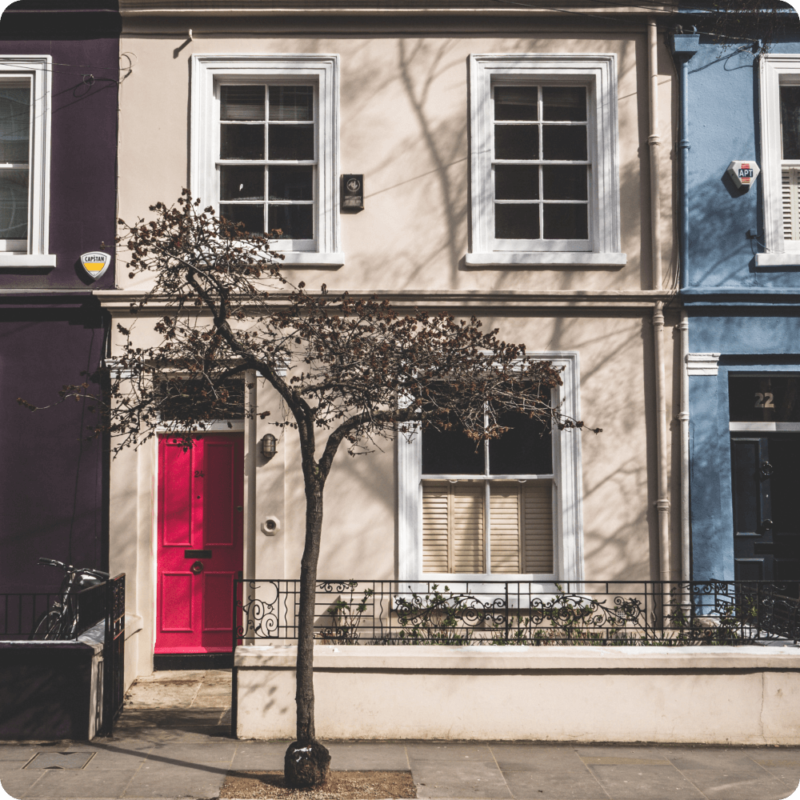How to Get on the Property Ladder
It’s becoming ever harder to get on the property ladder, so how can you get onto that first rung?
The average age of a first time buyer in the UK is 34, with the pandemic and the rising cost-of-living pushing the possibility of being a home-owner to later in life than many would prefer. Before Covid-19 hit, the average was 32.
Home Emergency Insurance for £130
- ✓ Covered up to £1,000 per emergency
- ✓ £250 for overnight accomodation
- ✓ Call out, labour & parts included
There are lots of reasons why people are getting onto the property ladder later than their parents would have, with the most obvious being the huge increase in property prices.
The current average price for a two-bed house in London is somewhere between £600-£850k depending on the borough, according to home.co.uk
Average UK property prices
As you can imagine, average property prices vary around the UK:
- Manchester: £260k
- Birmingham: £240k
- Edinburgh: £285k – £317k
- Cardiff: around £240k
People are also getting married later, or not at all, and so are often reliant on a single wage with which to buy their first home.
The jobs market also continues to change and, with people no longer necessarily needing to live in the cities where their work is based, people tend to move more and are perhaps less inclined to tie themself to one place by buying property early on.
Also, our general lifestyles have changed. With the rise of purpose-built apartments under build-to-rent schemes, which come with attractive benefits such as swimming pools, workspaces, bookable dining rooms and libraries, many people prefer to rent for longer.
However, if you are ready to take the plunge and buy your own place, here are some things we recommend you consider to make your first home more affordable.
Buying with others
To buy a house of any size currently you’ll need a minimum of a 5% deposit. According to Rightmove the average UK deposit is a gigantic £75,000.
The size of the deposit will vary depending on the individual buying and the size of the property. But £75k is obviously quite a lot for most singles to save by themselves, and an increasing number of people are deciding to throw their chips in with other people – a partner, friend, sibling, parent, or even a work colleague – and buy a property together.

If you do decide to buy with someone – or with a group of people – make sure you take your solicitor’s advice throughout the process. They are likely to suggest agreements that will make splitting the assets later much easier. While you may not think that you will need to do that, we urge you to, as circumstances can and do change, so you should be ready for any eventuality.
Even if you are on good terms with your fellow buyer when you decide to split the asset, things could sour, so have a plan at the beginning to save your relationship any issues down the road.
Buy as a buy-to-let
If you can’t afford to buy a property to live in yourself. How about getting one as a buy-to-let?
The latest round of interest rate increases could potentially make renting cheaper than buying, which is good news if you would prefer to rent so you’re not tied to a place. However, having an asset that you own is a great investment for your future, so you could look into investing in a property in a cheaper area of the country and renting it out, leaving you free to live wherever you like, but with your first investment under your belt.
The rental market is reported to currently be shrinking as more landlords sell up to take advantage of current high house prices, making it a good time to purchase a property to rent.
With further interest rate increases also on the cards, many mortgage advisers are recommending that if you do plan to buy, to do it sooner rather than later to get a better fixed rate mortgage deal.
Buy-to-let mortgage lenders also tend to be a bit more generous when it comes to lending as they know repayments will be covered by the rent from your tenants.
And if a few of you are clubbing together to invest in a buy-to-let property, the lenders will also take this into account.
Help-to-buy Scheme
Help to Buy is a government scheme which is only available to first time buyers looking to buy a new-build property.
This scheme is available up until March 2023 and any first-time buyers who want to take advantage of the scheme should reserve a property by the end of October. So if you’ve been paying into it over the last few years, you could get a tidy sum to help with your purchase, so don’t miss out on that by missing the deadline!

The scheme offers first-time-buyers an equity loan so they can buy a new-build property with a deposit of just 5%.
Mashroom reported recently that house prices have hit seven times the UK average income.
However, it is also being reported that there is expected to be a fall, or at least a leveling-off, of house prices in the second half of 2022. Good news if you are hoping to get a foot on the property ladder!
If buying a new-build is a possibility for you then get cracking via the help-to-buy scheme and reserve your property before the October deadline.
Help-to-Buy ISA
This is a government savings scheme which allows you to pay up to £200 a month and claim a bonus of 25% of your total savings.
The government will top your savings up to a maximum limit of £3,000 when you buy your first home. You can pay into the ISA until November 2029 and claim the 25% bonus until November 2030. Unfortunately, you can no longer open a Help-to-Buy ISA, so if you have got one, make sure you are paying into it monthly to get the best benefit when you buy.
If you are buying with someone who also has a Help-to-Buy ISA, both of you will get the 25% bonus.
Right-to-Buy
In June, the PM announced that he is bringing back the Right-to-Buy scheme.
This scheme is specifically for people living in social housing, but essentially offers anyone receiving benefits or classified as ‘low-income’ families the right to buy the house in which they live.
The government has also announced it is looking at a ‘savings vehicle’ which would help people in these circumstances to save the money they would need to buy their home.
The Right-to-Buy scheme would give people discounts of up to 70% on the price of their house, depending on how long they had lived there, which would open up property ownership to many more people.
Remortgaging of a family home to release equity
If you are considering remortgaging your home in order to help a child or family member get on the property ladder, then your first port of call needs to be a conversation with a reputable mortgage advisor.
You can also use online mortgage calculators to see how much you could borrow and the remortgage rates available.
While buying property can seem like an insurmountable task, it really can be done. The trick is not to be put off by how huge it seems. The best time to start saving was yesterday, the second best time is today!